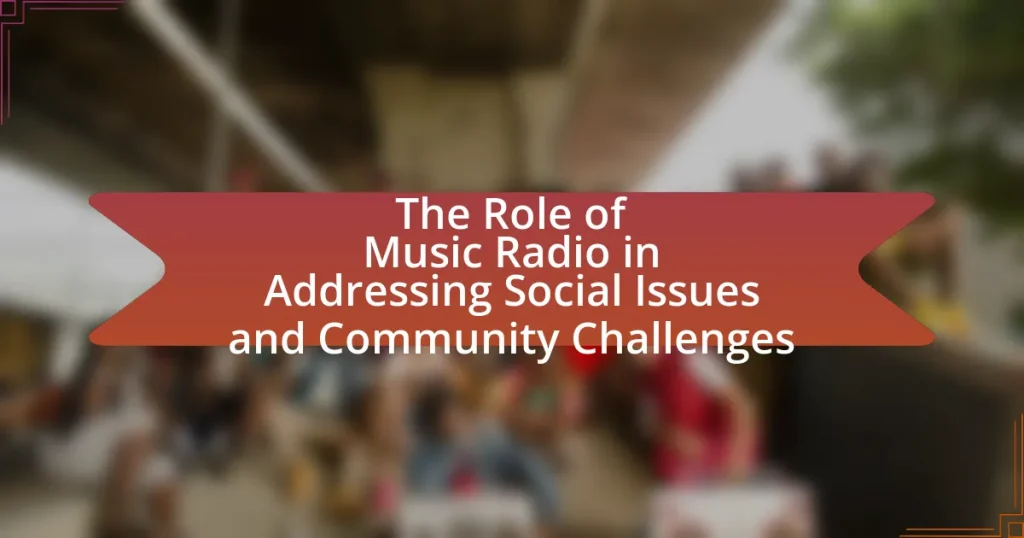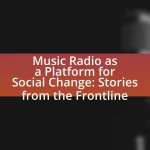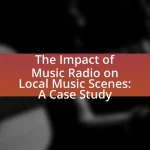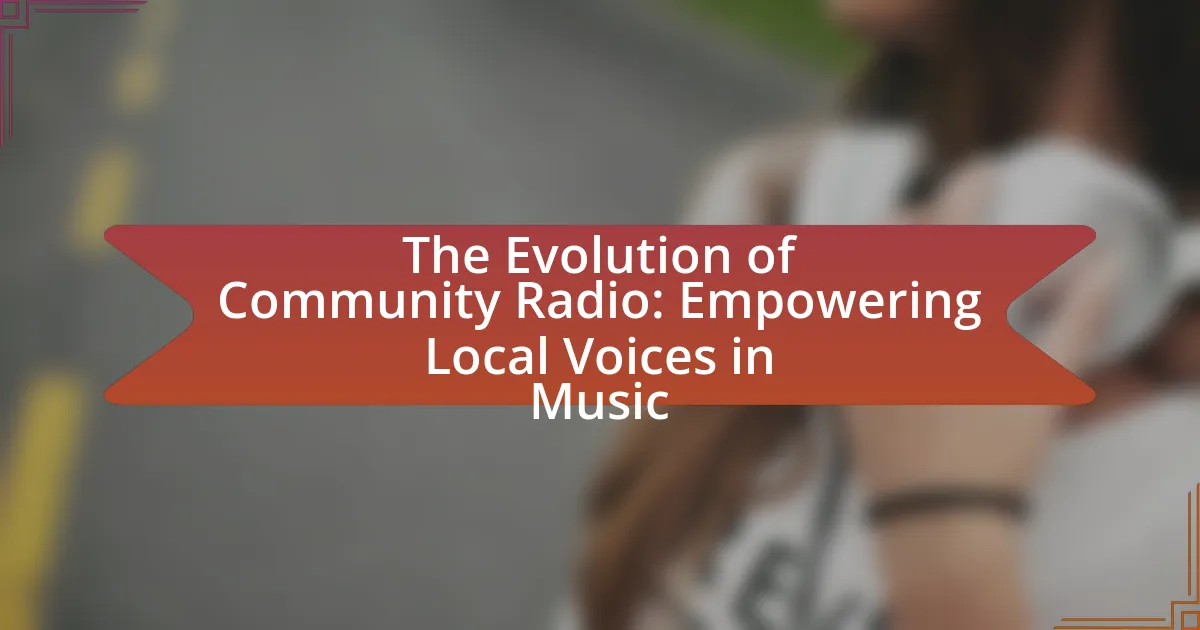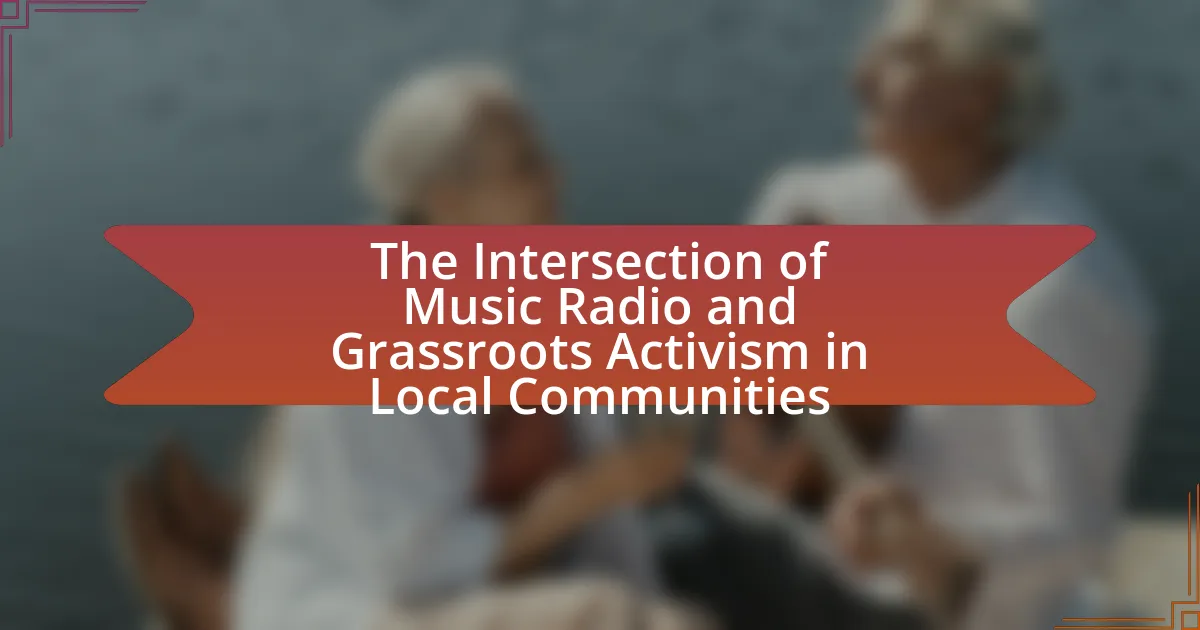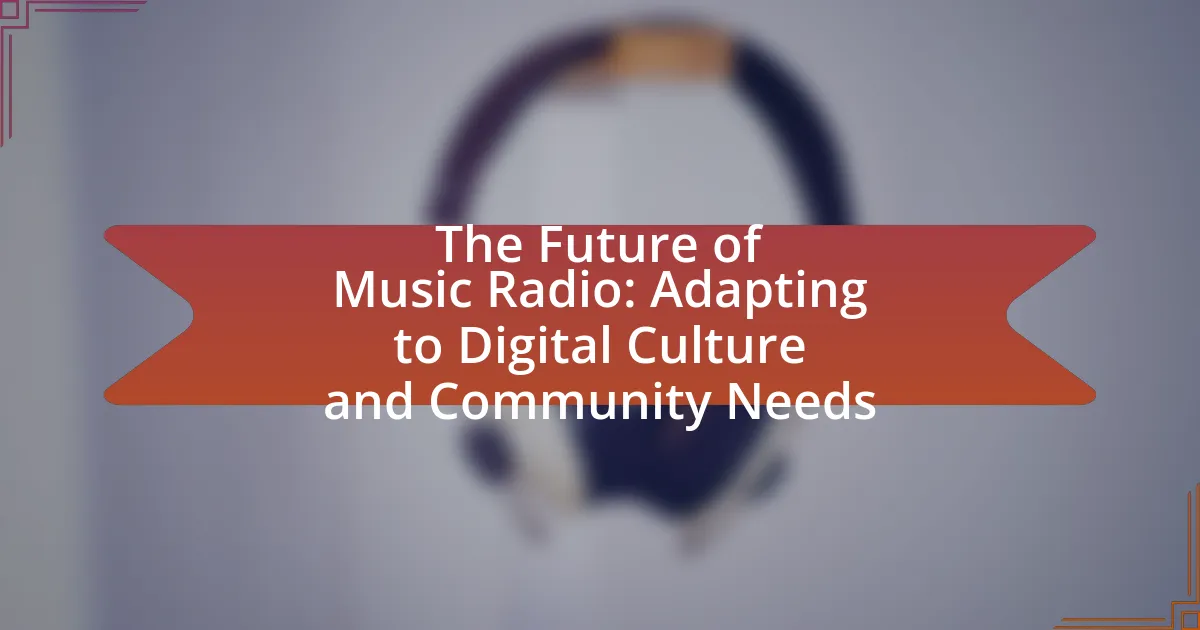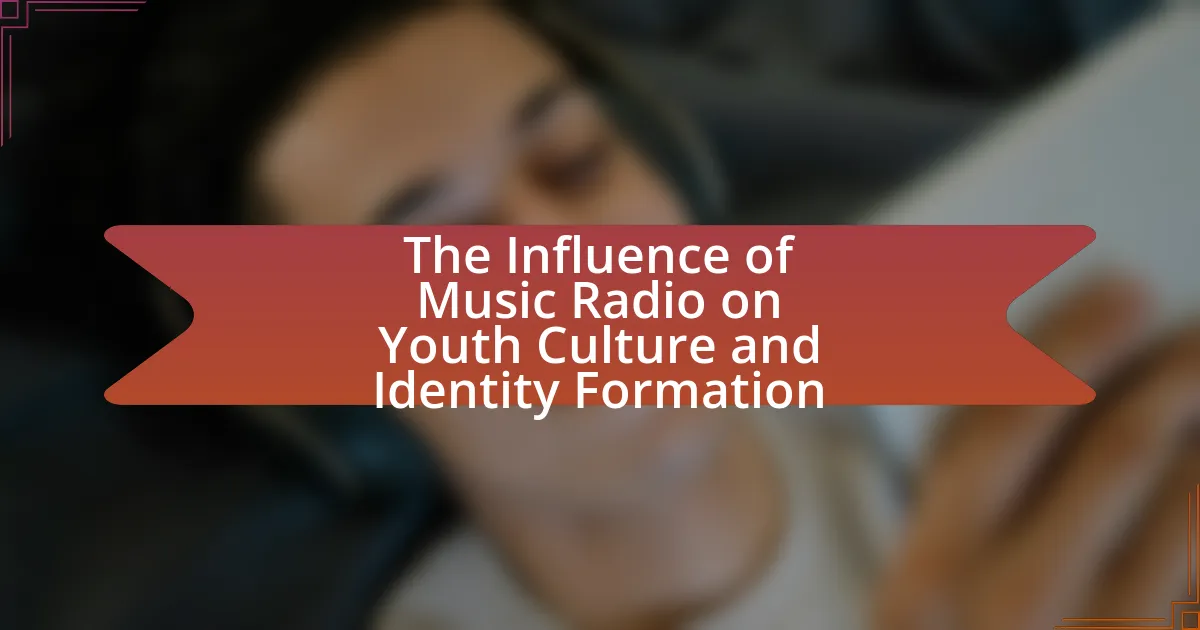Music radio serves as a vital platform for addressing social issues and community challenges by promoting awareness, education, and advocacy. It influences public consciousness on topics such as mental health, racial equality, and environmental concerns through curated playlists and discussions. The article explores how music radio raises awareness, fosters community engagement, and collaborates with local organizations to tackle pressing social issues. Additionally, it examines the historical impact of music radio on social movements and identifies best practices for enhancing its role in social advocacy. Challenges faced by music radio in addressing these issues, including funding limitations and commercial interests, are also discussed.
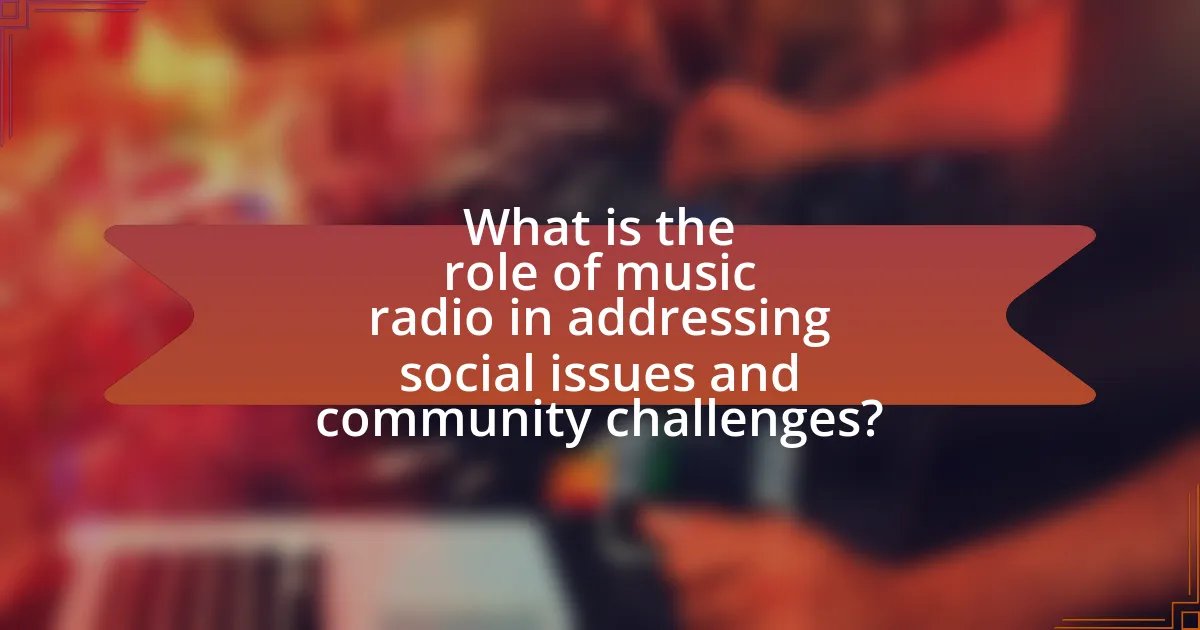
What is the role of music radio in addressing social issues and community challenges?
Music radio plays a crucial role in addressing social issues and community challenges by providing a platform for awareness, education, and advocacy. Through curated playlists and discussions, music radio stations can highlight social justice themes, mental health awareness, and community events, fostering a sense of unity and engagement among listeners. For instance, stations often feature songs that address topics like inequality and environmental concerns, which can inspire action and dialogue within communities. Additionally, music radio can serve as a resource for local organizations, promoting initiatives and events that tackle pressing social issues, thereby enhancing community involvement and support.
How does music radio influence public awareness of social issues?
Music radio influences public awareness of social issues by providing a platform for artists to address and discuss these topics through their lyrics and broadcasts. This medium amplifies messages related to social justice, inequality, and community challenges, reaching diverse audiences. For instance, during the Black Lives Matter movement, many music radio stations played songs that highlighted racial injustice, thereby educating listeners and fostering dialogue. Research indicates that music can evoke emotional responses, making listeners more receptive to social messages, as evidenced by studies showing increased awareness and engagement in social issues among audiences exposed to relevant music content.
What types of social issues are commonly addressed by music radio?
Music radio commonly addresses social issues such as mental health awareness, racial equality, poverty, and environmental concerns. These platforms often feature songs and discussions that highlight these topics, aiming to raise awareness and foster community dialogue. For instance, campaigns like “Mental Health Awareness Month” are frequently promoted through music radio, encouraging listeners to engage with mental health resources. Additionally, music radio has played a significant role in movements like Black Lives Matter, using its reach to amplify messages of racial justice and equality.
How do music radio programs raise awareness about these issues?
Music radio programs raise awareness about social issues and community challenges by integrating relevant discussions, interviews, and music that reflect these topics into their broadcasts. For instance, programs often feature artists who address social justice themes in their lyrics, thereby amplifying the message. Additionally, radio hosts may invite experts or activists to discuss pressing issues, providing listeners with insights and actionable information. According to a study by the Pew Research Center, 62% of listeners reported that radio helps them stay informed about local issues, demonstrating the medium’s effectiveness in raising awareness.
Why is music radio an effective medium for community engagement?
Music radio is an effective medium for community engagement because it fosters a sense of belonging and connection among listeners. By playing music that resonates with local culture and addressing community issues through discussions and interviews, music radio creates a platform for shared experiences. Research indicates that community radio stations, which often include music programming, enhance local participation and civic engagement, as evidenced by a study from the University of Southern California that found community radio listeners are more likely to engage in local events and initiatives. This engagement is further amplified by the interactive nature of radio, allowing listeners to call in, share their stories, and participate in discussions, thereby strengthening community ties.
What unique features of music radio facilitate community involvement?
Music radio facilitates community involvement through its interactive programming, local content focus, and accessibility. Interactive programming, such as call-in shows and social media engagement, allows listeners to participate in discussions and share their opinions, fostering a sense of community. The focus on local content, including news, events, and music from local artists, strengthens community ties by highlighting regional culture and issues. Additionally, music radio is accessible to a wide audience, including those without internet access, ensuring that diverse community members can engage with the station and each other. These features collectively enhance community involvement by creating a platform for dialogue, representation, and connection among listeners.
How does music radio foster a sense of community among listeners?
Music radio fosters a sense of community among listeners by creating shared experiences through music and discussions that resonate with local culture and issues. This medium often features local artists, promotes community events, and addresses social challenges relevant to the audience, thereby enhancing listener engagement and connection. For instance, studies have shown that community radio stations significantly contribute to local identity and cohesion by providing a platform for diverse voices and fostering dialogue on pressing social matters.
What are the historical impacts of music radio on social movements?
Music radio has historically played a crucial role in amplifying social movements by providing a platform for marginalized voices and facilitating the spread of revolutionary ideas. For instance, during the Civil Rights Movement in the 1960s, radio stations like WERD in Atlanta broadcasted music and messages that inspired activism and solidarity among African Americans. Additionally, music radio was instrumental in the anti-war movement, with stations airing protest songs that resonated with the public, such as “Fortunate Son” by Creedence Clearwater Revival, which criticized the Vietnam War and mobilized listeners against it. These examples illustrate how music radio not only disseminated information but also fostered community engagement and collective action, ultimately influencing public opinion and policy changes.
How has music radio contributed to significant social changes in the past?
Music radio has significantly contributed to social changes by promoting cultural movements and providing a platform for marginalized voices. For instance, during the Civil Rights Movement in the 1960s, radio stations played pivotal songs like “A Change Is Gonna Come” by Sam Cooke, which galvanized public support and awareness around racial equality. Additionally, music radio has historically been a medium for political expression, as seen in the anti-war songs of the 1970s that influenced public opinion against the Vietnam War. These examples illustrate how music radio has not only reflected societal issues but also actively shaped social discourse and mobilized communities for change.
What role did music radio play during key historical events?
Music radio played a significant role during key historical events by serving as a platform for communication, cultural expression, and mobilization. For instance, during the Civil Rights Movement in the 1960s, music radio broadcasted songs that became anthems for social change, such as “A Change Is Gonna Come” by Sam Cooke, which inspired activism and solidarity among listeners. Additionally, during the Vietnam War, music radio provided a voice for anti-war sentiments through songs like “Fortunate Son” by Creedence Clearwater Revival, influencing public opinion and fostering a sense of community among dissenters. These examples illustrate how music radio not only reflected societal issues but also actively contributed to shaping public discourse and encouraging collective action during pivotal moments in history.
How does music radio collaborate with local organizations to address community challenges?
Music radio collaborates with local organizations to address community challenges by creating partnerships that facilitate awareness and action on social issues. These collaborations often involve co-hosting events, such as fundraisers or community forums, where local organizations can share resources and information with the public. For instance, music radio stations frequently promote local non-profits through on-air announcements and interviews, increasing visibility for their causes. Additionally, music radio can serve as a platform for community discussions, allowing organizations to engage with listeners directly and mobilize support for initiatives like health campaigns or educational programs. This synergy not only amplifies the reach of local organizations but also fosters a sense of community engagement and responsibility among listeners.
What specific programs or initiatives have been successful in this collaboration?
Successful programs in the collaboration of music radio addressing social issues include community outreach initiatives, educational workshops, and fundraising events. For instance, programs like “Radio for Change” have effectively raised awareness about mental health issues through dedicated broadcasts and listener engagement, resulting in increased community support and resources. Additionally, educational workshops hosted by music radio stations have empowered local youth by providing skills in media production and music, fostering a sense of community and belonging. Fundraising events, such as benefit concerts organized by radio stations, have successfully generated financial support for local charities, demonstrating the tangible impact of music radio in addressing social challenges.
What challenges does music radio face in addressing social issues?
Music radio faces significant challenges in addressing social issues, primarily due to limited airtime for in-depth discussions and potential backlash from audiences. The format of music radio often prioritizes entertainment over serious discourse, which can lead to superficial treatment of complex social topics. Additionally, advertisers may influence content, discouraging stations from tackling controversial issues that could alienate listeners or sponsors. Research indicates that radio stations often avoid politically charged topics to maintain listener engagement, which can hinder meaningful dialogue on pressing social matters.
How do funding and resources impact music radio’s ability to tackle these issues?
Funding and resources significantly enhance music radio’s ability to address social issues and community challenges. Adequate financial support allows music radio stations to invest in quality programming, hire knowledgeable staff, and develop outreach initiatives that engage listeners on critical topics. For instance, stations with robust funding can produce specialized content that raises awareness about social justice, mental health, or community development, thereby fostering informed discussions among their audience. Additionally, research indicates that well-resourced stations are more likely to collaborate with local organizations, amplifying their impact through community partnerships and events. This synergy not only broadens the reach of important messages but also strengthens community ties, demonstrating that funding and resources are essential for music radio to effectively tackle societal issues.
What are the limitations of music radio in influencing social change?
Music radio has significant limitations in influencing social change, primarily due to its reliance on commercial interests and limited reach. Commercial music radio often prioritizes popular music that appeals to broad audiences, which can dilute messages related to social issues. For instance, a study by the Pew Research Center found that only 20% of radio stations dedicate airtime to social issues, limiting the exposure of critical topics. Additionally, music radio’s transient nature means that messages may not resonate deeply or lead to sustained engagement, as listeners often tune in for entertainment rather than activism. Furthermore, regulatory constraints can restrict the content that stations can broadcast, hindering their ability to address controversial social issues effectively.
What best practices can music radio adopt to enhance its role in social advocacy?
Music radio can enhance its role in social advocacy by actively engaging with community issues through targeted programming and partnerships. By dedicating airtime to discussions on social justice, mental health, and environmental concerns, music radio stations can raise awareness and foster dialogue among listeners. For instance, incorporating interviews with local activists or experts can provide valuable insights and encourage community involvement. Additionally, collaborating with non-profit organizations for fundraising events or awareness campaigns can amplify the station’s impact. Research indicates that media outlets that engage in social advocacy can significantly influence public perception and behavior, demonstrating the effectiveness of these practices in promoting social change.
How can music radio improve its outreach and engagement strategies?
Music radio can improve its outreach and engagement strategies by leveraging social media platforms to connect with listeners and promote interactive content. By utilizing platforms like Instagram, Twitter, and Facebook, music radio stations can share real-time updates, host live Q&A sessions, and encourage listener participation through polls and contests. Research indicates that 54% of radio listeners engage with stations on social media, highlighting the effectiveness of this approach in fostering community involvement and enhancing listener loyalty. Additionally, incorporating local events and community-focused programming can further strengthen ties with the audience, making the station a vital part of the community’s social fabric.
What innovative approaches can music radio take to address emerging social issues?
Music radio can adopt interactive programming, such as live call-ins and social media engagement, to address emerging social issues. This approach allows listeners to share their experiences and perspectives, fostering community dialogue. For instance, during the COVID-19 pandemic, many radio stations utilized platforms like Twitter and Instagram to facilitate discussions on mental health, providing listeners with resources and support. Additionally, music radio can curate playlists that highlight social justice themes, raising awareness about issues like racial inequality and climate change. Research shows that music can influence public perception and inspire action, making it a powerful tool for advocacy. By integrating these innovative strategies, music radio can effectively engage audiences and promote social change.
